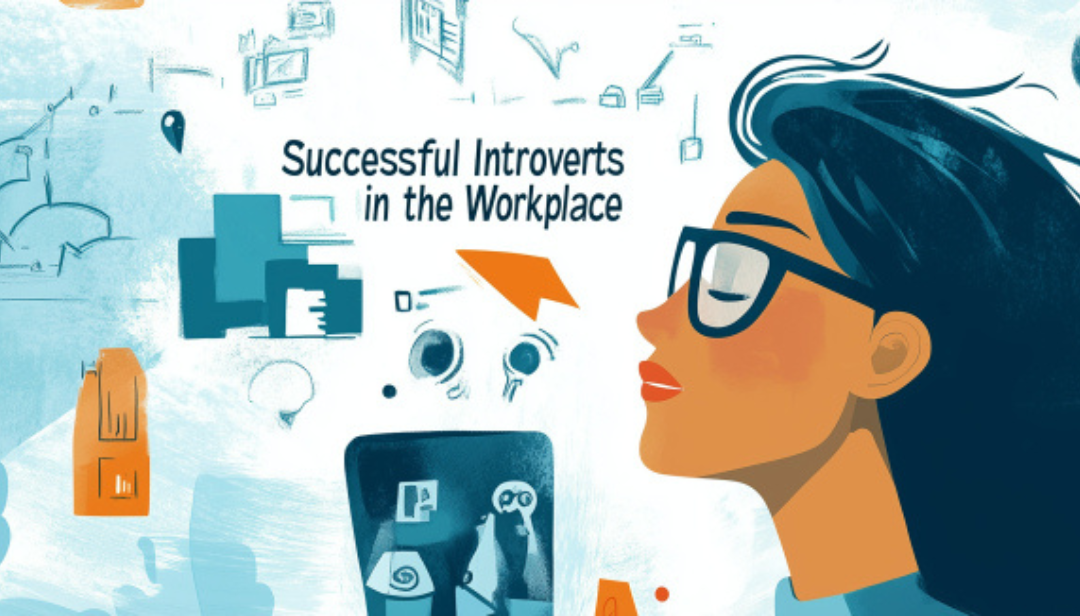Attention All Introverts in the Workplace: 4 Skills of Successful Introverts to Advance Your Career!
How can an introvert succeed in career? If you are an introvert, you might believe you must become more outgoing and sociable. However, career success and advancement can be yours by leveraging your introverted powers. Learn the skills of successful introverts!


Back
6 mins read
Many introverts live their life under the pretense that they must change — or fake — who they are to have a blooming career.
The modern Western world does seem to endorse extroverted traits. Self-promotion is expected — in the workplace, business, and private lives. Unless you constantly advertise yourself and build connections, you almost become invisible. Fear of being ostracized is common among those uncomfortable with much exposure.
However, it does not mean you must become someone you are not — or come to peace with being underpaid and overworked. Introverted employees can still strive in a workplace environment and collaborate effectively with extroverted colleagues.
Your introversion is, in fact, a valuable asset that provides you with a unique perspective and mindset so necessary for achieving success in a collaborative work environment.
If you are an introvert, you possess several crucial traits that make you as likely to succeed as any extrovert. You have the power within you to make just about any workplace an introvert-friendly work environment! (Unless, of course, it's a toxic work environment, and you wouldn't want to stay there anyway.)
You only need to recognize and learn to employ these superpowers to get ahead at work. It’s time to celebrate who you are as an introvert in the workplace!
4 Introverted Personalities' Super-Skills for Career Advancement

When you imagine a CEO, you probably envision a charismatic speaker who mesmerizes others with their people skills and strong personality.
They are outgoing and easily dominate every meeting, throwing ideas and comments around. The more people surround them, the more energy they seem to have.
As an introvert, I was always repelled by the idea of speaking and acting like that to reach greatness as a professional. And I admit — I am thrilled now that I work as a freelance writer in solitude and from home.
Yet, before that, I spent five years as an educator and trainer in a non-profit organization. And I was booming, introverted as I was!
How?
I employed our introverts’ superpowers to grow as a professional in that group setting!
1. Introverts Tend to Prefer Profound Relationships

I constantly interacted with at least 15 chatting coworkers and volunteers during my years in the said NGO. Such circumstances would probably galvanize an extravert. Even though I loved those people and our team dynamics, my energy drained out of me increasingly with every passing hour.
It is not like introverts are shy or dislike people. We merely recharge when we can take some time for ourselves. Introverts thrive in solitude, left alone with their thought process.
Conversely, when you think of a successful leader or business person, they never miss a networking event. You see them constantly mingling, building as many connections as there are people in the room.
So, are introverts doomed as leaders? By no means!
A preference for forming deep, powerful relationships characterizes introverts. Even if you feel like a fish out of water in social settings, you can recruit this strength in one-on-one interactions, gradually build your network, and become a social introvert. Unlike many believe, successful introverts can have great socialization skills, and this is mostly due to their excellent listening skills
People want to be listened to, but more importantly, they want to be heard! Introverts, being good listeners, can be excellent leaders and lead their organizations to success.
With more and more companies gravitating towards a flatter structure, prioritizing the importance of listening to the feedback of every employee, introverts can become great leaders by simply allowing others to speak up. Research actually shows that people with introverted personalities do better than their extroverted counterparts in certain types of leadership roles and work environments.
Moreover, high levels of empathy and complete investment in a conversation make introverted coworkers highly appreciated by their peers. The time spent building individual relationships also goes a long way toward team bonding and team building.
You should play to that strength and form profound connections with people. One by one, at your pace — and why not?
2. Introverts' Need for Thorough Thinking

I confess I always felt disadvantaged in meetings because I could not develop brilliant ideas on the spot. I compared myself with others who would brainstorm like it was the easiest thing in the world. Contrary to this, fantastic solutions kept popping up in my head when I came home.
Consequently, I got anxious about speaking up in meetings. I feared others would think my contributions were poor, to say the least. The association between introversion and a fear of being negatively evaluated was confirmed in research.
However, I discovered a scientific explanation for something I considered slow thinking (even though very potent). Extraverts and introverts process information differently. Introverts’ thinking process involves more use of frontal lobes, front insular, left hippocampus, and Broca’s area. Because of this, our thought process lasts longer — but is highly thorough and deliberate.
Yes, we are deep thinkers, and before sharing our thoughts with others, we have to weigh the pros and cons thousands of times. We need a quiet space to focus and only immerse ourselves in our internal world. This solitude allows us to process information more deeply and come up with out-of-the-box solutions, which makes us great listeners and problem solvers
Plus, introverts’ inclination towards skepticism produces critical thinking that can be invaluable for any business. And critical thinking is a key to innovation and competitive advantage.
All you need to do now is recognize this fact, be explicit about it, and showcase this skill. For example, the next time a meeting takes place, let your superior know you do not want to rush to conclusions. Say you will get back to them once you research and analyze the situation. They will surely appreciate it.
3. Introverts Thrive in Independent Projects

If you are an introvert, you are probably more reserved — maybe even withdrawn from the work collective. Some people might even perceive you as passive-aggressive or suspiciously quiet.
The foundational difference between extroverts and introverts is where they source energy from. Psychological research confirmed that extroverts flourish in an abundance of social interactions.
Introverts need autonomy and alone time to tap into their supply of energy and creativity. In other words, you work best when left to make your own choices. You are self-directed and do not need constant monitoring or bouncing ideas off someone to develop innovative solutions.
Even though not everyone will appreciate your unwillingness to socialize, remember that reservation opposes impulsiveness. This is your strength.
Needing alone time to contemplate the information you received during a meeting quietly is not a bad thing. You are an independent thinker and worker; any employer will be thrilled to have such a self-efficient worker.
4. Introverts in Workplace: Leveraging Tech Tools

While introverts tend to feel uncomfortable in a real-life social setting, they leverage technology to communicate with others. With the ever-increasing popularity of remote work, digital communication skills have become more crucial than ever, and introverts are well-positioned to excel in this environment.
Unlike extroverts, who suffered immense stress during the COVID-19 pandemic, we were able to adapt and feel comfortable when the extroverted world was falling apart. A traditional office environment often poses challenges for introverts in the workplace, but the shift to remote work during the pandemic allowed us to thrive in a space where we felt more in control and less overwhelmed by constant social interaction.
Introverts typically excel in creating thoughtful, well-crafted written communications, a skill that becomes particularly valuable in remote work settings. This ability to articulate ideas clearly in emails, reports, and project plans allows for effective collaboration, even from a distance.
This ability makes introverted people not only effective communicators in remote settings but also highly valuable in a traditional work environment. Their proficiency in written communication ensures clarity and precision in conveying complex ideas, making them indispensable in team building, collaborations, project documentation, and crafting detailed strategies.
Workplace Introverts Move Ahead — Your Way

Navigating the challenges of being a workplace introvert requires understanding how to use one's innate strengths in a professional setting. Suppose you compare your psychological profile with that of a typical entrepreneur. Doing so might make you feel like many business careers are not meant for you.
And yes, extroverts might enjoy and flourish in some professions more.
Do you want to find what jobs are better suited for your introverted personality? Take a career test and discover the potential career paths that align with your strengths and preferences
However, your chances of succeeding in most jobs are by no means hindered by introversion. You have an introvert’s strengths that have already led many of the world’s most successful businesspeople to great accomplishments.
As an introvert, you are energized by alone time. You have a strong preference for deep thought over quick solutions. Your relationships are profound. Autonomy and independence are your strong suits.
Where you sit on the introversion-extraversion continuum is a highly significant characteristic of your personality. It affects your interpersonal relationships and career choices. Because of its importance, the dimension is incorporated in many popular tests, such as the MBTI.
It is vital to understand how introversion might affect you to leverage it. This article revealed the four traits introverted employees have up their sleeves to thrive at work.
Utilize your introverted super-skills and advance your career — your way!


Return to Blog




